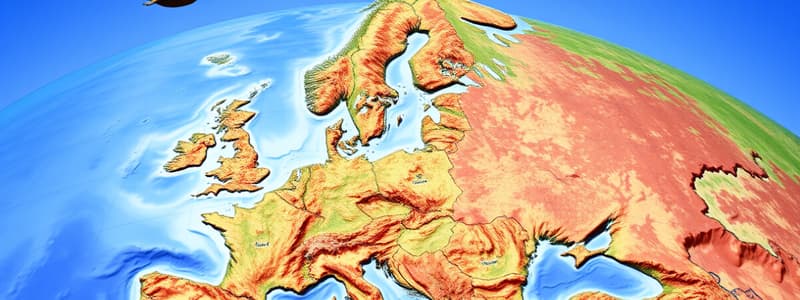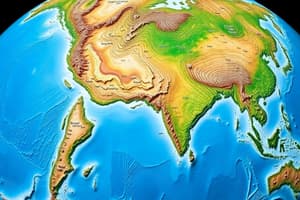Podcast
Questions and Answers
What term describes the exact coordinates of a location?
What term describes the exact coordinates of a location?
- Vernacular Location
- Relative Location
- Functional Location
- Absolute Location (correct)
Which branch of geography focuses on human activities and their impacts on the environment?
Which branch of geography focuses on human activities and their impacts on the environment?
- Physical Geography
- Geopolitical Geography
- Cartography
- Human Geography (correct)
What term is used for the movement of people from one place to another?
What term is used for the movement of people from one place to another?
- Trade
- Transportation
- Urbanization
- Migration (correct)
Which map type is primarily used for showing physical features of the landscape?
Which map type is primarily used for showing physical features of the landscape?
What is a key aspect of sustainability in geography?
What is a key aspect of sustainability in geography?
Which type of region is defined by perceived characteristics rather than official boundaries?
Which type of region is defined by perceived characteristics rather than official boundaries?
What is Remote Sensing primarily used for in geography?
What is Remote Sensing primarily used for in geography?
What is one major trend in modern geography related to urban areas?
What is one major trend in modern geography related to urban areas?
Flashcards are hidden until you start studying
Study Notes
Definition of Geography
- Study of the Earth’s landscapes, environments, and the relationships between people and their environments.
- Divided into two main branches:
- Physical Geography: Focuses on natural features and processes.
- Human Geography: Focuses on human activities and their impact on the environment.
Key Concepts
-
Location
- Absolute Location: Exact coordinates (latitude and longitude).
- Relative Location: Position in relation to other locations.
-
Place
- Physical Characteristics: Landforms, climate, vegetation.
- Human Characteristics: Culture, economy, architecture.
-
Human-Environment Interaction
- How humans adapt to and modify their environment.
- Examples: Farming practices, urban development.
-
Movement
- Migration: Movement of people from one place to another.
- Trade: Exchange of goods and services between regions.
-
Region
- Areas defined by shared characteristics (cultural, physical, economic).
- Types: Formal (defined boundaries), Functional (center and surrounding areas), Vernacular (perceived regions).
Major Themes in Geography
- Globalization: Increasing interconnectedness of the world through trade, communication, and culture.
- Sustainability: Balancing human needs with environmental protection.
- Urbanization: Growth of cities and its impact on society and the environment.
Tools and Techniques
- Maps: Visual representations of areas.
- Types: Political, physical, thematic.
- GIS (Geographic Information Systems): Technology for mapping and analyzing spatial data.
- Remote Sensing: Gathering information about the Earth’s surface from satellites or aerial imagery.
Physical Geography Topics
- Landforms: Mountains, valleys, plateaus, plains.
- Water Bodies: Oceans, rivers, lakes, glaciers.
- Climate and Weather: Study of atmospheric conditions and long-term patterns.
Human Geography Topics
- Population Geography: Distribution, density, and demographics of populations.
- Cultural Geography: Exploration of cultural practices, languages, religions.
- Economic Geography: Study of economic activities and resources distribution.
Current Trends in Geography
- Impact of climate change on landscapes and human activities.
- Urban planning and smart cities for sustainable development.
- Geopolitical issues and territorial disputes influenced by geography.
Definition of Geography
- Geography examines Earth's landscapes, environments, and human-environment relationships.
- Two primary branches:
- Physical Geography: Analyzes natural features and processes such as landforms and climates.
- Human Geography: Investigates human activities and their effects on the environment.
Key Concepts
-
Location
- Absolute Location: Identified with precise coordinates of latitude and longitude.
- Relative Location: Determined by one's position in relation to other locations.
-
Place
- Physical Characteristics: Includes aspects like landforms, climate, and vegetation types.
- Human Characteristics: Encompasses culture, economy, and architectural styles.
-
Human-Environment Interaction
- Focuses on how humans adjust to and alter their surroundings.
- Examples include agricultural practices and urban development strategies.
-
Movement
- Migration: Involves the relocation of people from one area to another.
- Trade: Exchange of goods and services across different regions.
-
Region
- Areas are classified based on shared traits, which can be cultural, physical, or economic.
- Types of regions include:
- Formal: Defined by specific boundaries (e.g., countries).
- Functional: Organized around a focal point and its surrounding areas (e.g., metropolitan areas).
- Vernacular: Perceived regions based on common cultural traits (e.g., "the South").
Major Themes in Geography
- Globalization: Refers to the growing interconnection of the world through economic, cultural, and technological exchanges.
- Sustainability: Emphasizes the need to balance human development with environmental conservation.
- Urbanization: The expansion of urban areas and its socio-environmental consequences.
Tools and Techniques
- Maps: Serve as visual aids to depict areas; types include political, physical, and thematic maps.
- GIS (Geographic Information Systems): Utilized for the analysis and mapping of spatial data.
- Remote Sensing: Involves collecting data about the Earth's surface via satellite or aerial imaging.
Physical Geography Topics
- Landforms: Includes various terrains such as mountains, valleys, plateaus, and plains.
- Water Bodies: Covers oceans, rivers, lakes, and glaciers.
- Climate and Weather: Studies atmospheric conditions and long-term climate trends.
Human Geography Topics
- Population Geography: Examines how populations are distributed, their density, and demographics.
- Cultural Geography: Investigates cultural practices, languages, and religious beliefs.
- Economic Geography: Focuses on how economic activities are distributed in relation to resources.
Current Trends in Geography
- Climate change's effects on both natural landscapes and human activities are increasingly relevant.
- Urban planning initiatives aim for sustainable development through smart city designs.
- Geopolitical issues and territorial disputes are often influenced by geographical factors.
Studying That Suits You
Use AI to generate personalized quizzes and flashcards to suit your learning preferences.




